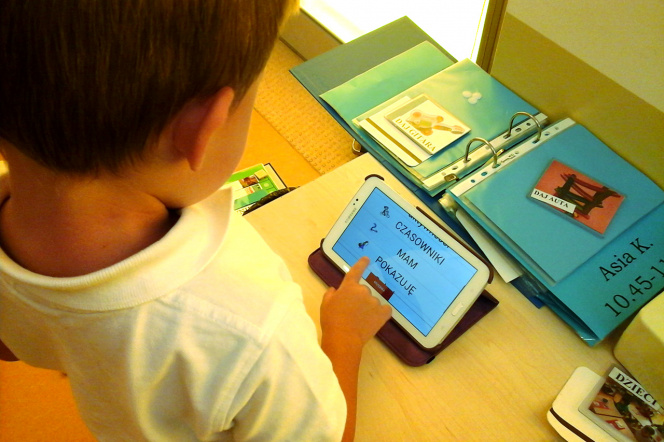Date added: 2021-06-14
User-friendly apps help children with autism develop a variety of skills

Children with autism spectrum disorders struggle with many deficits that also affect their learning abilities. Their education, which is quite a challenge for both therapists and parents, should be tailored individually to the abilities of each pupil in such a way as to create optimal conditions for their development.
One of the approaches often used in the treatment and education of people with autism is the approach based on applied behavior analysis. Its effectiveness has been confirmed in many scientific studies, also in preschool children. This therapy is based on modeling and rewarding desired behaviors. Specially prepared applications that meet specific requirements can be a significant support during the learning process.
– Children with autism spectrum disorders especially like electronic devices, working with tablets or other mobile gadgets – explains prof. Agnieszka Landowska, project leader from Gdańsk University of Technology – They do not need any encouragement to use them. Moreover, research shows that the use of well-chosen applications has a positive effect on the development of these children's skills.
From an idea to its implementation
The idea of creating "Friendly applications" appeared during the researcher's talks with the training staff of the Foundation - Institute for Child Development from Gdańsk.
– We saw great potential in new technologies, unfortunately, the Polish market lacked applications that would be adapted to the needs of children with autism, and foreign products were too expensive – explains PhD Anna Budzińska, director of the IFCD – So the project of creating applications in cooperation with Gdańsk University of Technology that each parent or therapist would be able to download to the child’s tablet for free, fully complied with the mission of our foundation. As specialists, we were able to suggest specific solutions, and the validation process of each application always took place with the participation of recipients, both children with autism and our therapists, thanks to which it was possible to fully adapt the application to our requirements.
– Designing Friendly Applications uses the achievements of research on the effectiveness of therapy based on applied behavior analysis - adds prof. Agnieszka Landowska – In particular, the project uses the method of activity plans that help people with autism to independently perform various tasks and activities and allow them to develop social behavior.
The project was gradually gaining momentum. Initially, in addition to the IFCD team, a team of students from the FETI was involved in its implementation. In the following years, professional IT specialists joined the team. Currently, a few to a dozen or so people are working on the development and updating of the applications - both students and employees from the university and experts from outside Gdańsk Tech.
Since its creation in 2014, the project has been developed in accordance with the Open Source idea. This means that the developed applications are publicly available and can be used without any license fees. In addition to the Gdańsk IFCD, the application is used in daily therapy by facilities recommended by IFCD from Poznań, Toruń, Żukowo, Kołobrzeg, Płock, Szczecinek, Warsaw and Legionowo.
The four most important criteria
– Children with autism are a particularly demanding recipient. When creating an application, we always follow the four most important criteria, which are: simplicity of interaction, repeatability, personalization and stability. Therefore, "friendly applications" may seem downright strange for an external recipient, in today's world of rich computer graphics – explains the researcher – Additional decorative elements, animations, buttons are unnecessary distractions that draw the child away from the main task that is to be performed.
Repeatability is a criterion that helps to learn how to use the application faster. Stability guarantees that the application is resistant to user errors. The great advantage of personalization is the ability to prepare individual tasks tailored to the needs of a given child.
Friendly Family
During the seven years of the project implementation, a group of six applications was created:
- Friendly Plan and Friendly Plan Manager, which enable therapists and teachers to create individual educational paths
- Friendly Lines and Friendly Letters - an educational game supporting the development of graphomotor skills in a child
- Friendly Words and Friendly Words Manager - a game supporting the development of speech understanding
- Friendly Emotions - an application that develops the emotional intelligence of the child.
– We are most pleased with the fact that the friendly applications are used both by therapists and parents in the daily therapy of children with autism and other challenges – adds PhD Budzińska.
The applications are available for free from the Google Play store (the Friendly Emotions application will be available soon). Their authors encourage customers not only to use them, but also to join the work on other applications - the project is implemented in the model of the so-called open source code.

